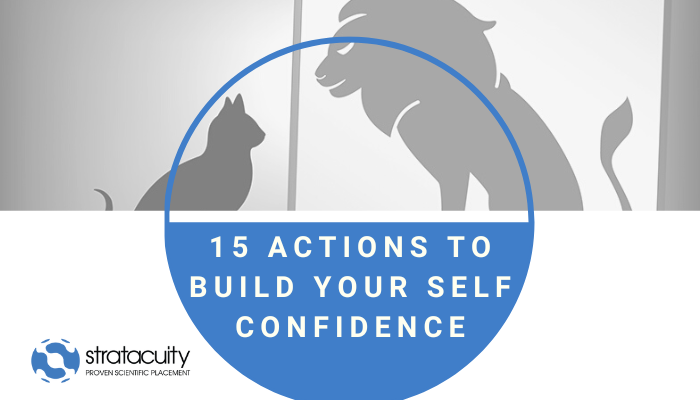Prepare and practice – Our self-confidence often suffers when we are inadequately prepared. Eliminate this by doing your research prior to big meetings, presentations, etc., and don’t forget to practice. The more you rehearse, the more confident you will feel in any situation.
Express yourself through body languages – First impressions happen quickly and often before you even say a word. Make sure your body language emits self-confidence by sitting upright with your chin up, standing straight, using direct eye contact, shaking hands firmly, using open gestures with your body and arms, and being generous with your smile.
Speak with a deliberate voice – Just as with your body language, make sure your voice gives an impression of self-confidence as well. Don’t use a weak, unsure or timid voice. Don’t mumble. Speak with a strong and passionate voice. Engage others in conversation, and participate yourself in meetings and get-togethers.
Promote positive self-talk; eliminate negative self-talk – You become what you think about all day long. Your inner dialogue is how you are programming yourself to think. Give yourself respect. Be honest and truthful, but also cut yourself some slack. Create a self-fulfilling prophecy by thinking about yourself as who you want to become.
Do not be controlled by what others think about you – Listen to other’s opinions of you, consider any lessons, and then move on. Never allow your source of self-confidence to come from someone else.
Listen to your own advice – Talk to yourself the way you would a close friend who asks you for advice. Apply the same wisdom you would give to others to your own feelings, thoughts, and situations.
Be a good actor – You’ve heard the saying before: fake it till you make it. It’s true advice. Once you know how you wish to be, then act out that image. We change through repetitive acting and “pretending” to be who we want to become until we truly become it.
Seek out a mentor – Find someone whose self-confidence you admire, and observe their actions. Learn their behavior and copy it in your own interactions and self-talk.
Do something risky – Step outside of your comfort zone and take on something you would typically avoid; afterwards, look for any lessons, and then try again.
Don’t fear failure – Never see failure as final. Use any failures merely as stepping stones in progress. People who fail the most are often those who achieve the most.
Create an affirmation file – Save memorabilia that gives you reassuring, positive feelings; such as, emails, letters, texts, performance reviews, etc. Visit the affirmation file during low moments. And don’t downplay any compliments you receive, accept them graciously and allow yourself to feel affirmation.
Record your accomplishments each day – List your accomplishments each day in a journal. Review the journal periodically. You’ll be surprised at how much you’ve achieved, and how it can change the way it makes you feel about yourself.
Live in your present moments – Resist living in the past or the future. Focus on the only state that matters – the here and now. Doing so can increase your sense of control and make you feel empowered.
Avoid being around people who are toxic – Who you surround yourself with can greatly affect the way you feel about yourself. Eliminate those who put you down, are constantly critical, or overall behave destructively. Replace them with people who encourage and support you.
Seek professional help – Don’t allow the stigma of asking for help stop you from seeking it if you feel your low self-confidence is affecting you professionally and personally
About the contributor:
Neal Whitten: Neal is a frequent presenter and keynote speaker at conferences, seminars, workshops, and special events. He has developed and instructed dozens of unique leadership, project management and personal development classes, and presented to many thousands of people from across hundreds of companies, institutions and public organizations. He has written over 100 articles for professional magazines and had been a contributing editor of PMI’s PM Network® magazine for over 15 years.
Source: Apex Systems


Al great deal for a web developer. Details: https://zetds.seychellesyoga.com/var_montero
Content for your website https://zetds.seychellesyoga.com/info
Web Development Wizards https://zetds.seychellesyoga.com/info
Can provide a link mass to your website https://zetds.seychellesyoga.com/info
Your site’s position in the search results https://zetds.seychellesyoga.com/info
Free analysis of your website https://zetds.seychellesyoga.com/info
Content for your website https://zetds.seychellesyoga.com/info
Outstanding feature
Excellent write-up
Very interesting topic, appreciate it for posting.Money from blog
This was a delight to read. You show an impressive grasp on this subject! I specialize about Lottery and you can see my posts here at my blog Article Star Keep up the incredible work!